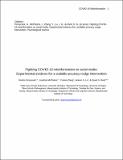| dc.contributor.author | Pennycook, Gordon | |
| dc.contributor.author | McPhetres, Jonathan | |
| dc.contributor.author | Lu, Guannan | |
| dc.contributor.author | Rand, David G. | |
| dc.contributor.author | Zhang, Yunhao,S.M.Massachusetts Institute of Technology. | |
| dc.date.accessioned | 2020-07-08T14:11:31Z | |
| dc.date.available | 2020-07-08T14:11:31Z | |
| dc.date.issued | 2020-06 | |
| dc.date.submitted | 2020-04 | |
| dc.identifier.issn | 0956-7976 | |
| dc.identifier.issn | 1467-9280 | |
| dc.identifier.uri | https://hdl.handle.net/1721.1/126080 | |
| dc.description.abstract | Across two studies with more than 1,700 U.S. adults recruited online, we present evidence that people share false claims about COVID-19 partly because they simply fail to think sufficiently about whether or not the content is accurate when deciding what to share. In Study 1, participants were far worse at discerning between true and false content when deciding what they would share on social media relative to when they were asked directly about accuracy. Furthermore, greater cognitive reflection and science knowledge were associated with stronger discernment. In Study 2, we found that a simple accuracy reminder at the beginning of the study (i.e., judging the accuracy of a non-COVID-19-related headline) nearly tripled the level of truth discernment in participants’ subsequent sharing intentions. Our results, which mirror those found previously for political fake news, suggest that nudging people to think about accuracy is a simple way to improve choices about what to share on social media. | en_US |
| dc.publisher | SAGE Publications | en_US |
| dc.relation.isversionof | http://dx.doi.org/10.1177/0956797620939054 | en_US |
| dc.rights | Creative Commons Attribution-Noncommercial-Share Alike | en_US |
| dc.rights.uri | http://creativecommons.org/licenses/by-nc-sa/4.0/ | en_US |
| dc.source | bioRxiv | en_US |
| dc.title | Fighting COVID-19 Misinformation on Social Media: Experimental Evidence for a Scalable Accuracy-Nudge Intervention | en_US |
| dc.type | Article | en_US |
| dc.identifier.citation | Pennycook, Gordon, et al. "Fighting COVID-19 Misinformation on Social Media: Experimental Evidence for a Scalable Accuracy-Nudge Intervention." Psychological Science (June 2020): p. 1-11 doi 10.1177/0956797620939054 ©2020 The Author(s) | en_US |
| dc.contributor.department | Sloan School of Management | en_US |
| dc.contributor.department | Massachusetts Institute of Technology. Institute for Data, Systems, and Society | en_US |
| dc.relation.journal | Psychological Science | en_US |
| dc.eprint.version | Original manuscript | en_US |
| dc.type.uri | http://purl.org/eprint/type/JournalArticle | en_US |
| eprint.status | http://purl.org/eprint/status/NonPeerReviewed | en_US |
| dspace.date.submission | 2020-07-08T12:45:27Z | |
| mit.license | OPEN_ACCESS_POLICY | |
| mit.metadata.status | Complete | |
